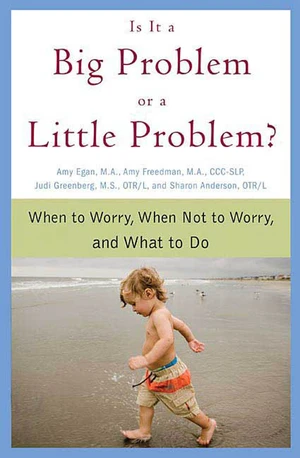Your road map through the ups and downs of early childhood Almost every child, at some point during their early years won't listen, will throw a tantrum, will be mean or aggressive, shy or withdrawn, be a picky eater, and more. As a parent, you know that differences in children's learning styles and temperaments are a given. However, when any of these problem behaviors become the 'norm' for a child, a red flag should go up. If they affect a child's ability to be happy, relate to others, and go about his daily life, there may be a real problem. Is it a Big Problem, or a Little Problem? will help you to determine: -The size of the problem -How to manage problems on your own with practical tips and strategies -When, if at all, to seek a professional evaluation and what to do in the meantime Learn when to worry, when not to worry, and what to do. This book will be your essential guide to decoding your child's behavior and navigating the early years of childhood. SHARON ANDERSON, OTR/L, AMY WUSTERBARTH EGAN, MA, AMY FREEDMAN, MA, CCC-SLP, and JUDI GREENBERG, MS, OTR/L are based in Rockville, Maryland at the Ivymount School's Center for Outreach and Education (CORE). Their mission is to help teachers and families identify needs and implement strategies for helping young children be more successful at home and at school. This unique developmental team of four: a speech pathologist, two occupational therapists and a special educator/behavior specialist, hold lectures and workshops throughout the Washington DC area for parents and professionals. Library Journal review: * * *Anderson, Sharon & others (text) & Jessica Glickman (illus.). Is It a Big Problem or a Little Problem?: When To Worry, When Not To Worry, and What To Do. Griffin: St. Martin's. Dec. 2007. c.352p. illus. bibliog. index. ISBN 978-0-312-35412-1. pap. $14.95. CHILD REARING Many exasperated parents have wondered whether their three year old needs to have his or her hearing checked. Developmental concerns are common, but it can be difficult to tell what behavior is a "stage" and what is cause for genuine concern. The authors, Anderson, Amy Egan, Amy Freedman, and Judi Greenberg-all speech, language, behavior, and occupational therapists at the Ivymount School's Center for Outreach and Education in Rockville, MD-divide the book into three sections, "The Basics," "Understanding Development," and "Where Children Struggle." Within these, they illustrate specific concerns (e.g., "She can hear, why doesn't she understand?"), explore the range of normal, and examine signals that indicate a need for professional intervention. For "little problems," the authors teach how to rework an environment, routine, or communication strategy to alleviate triggers and encourage mastery. Their strategies for reteaching crucial developmental milestones range from the simple (e.g., no more sippy cups; straws not only improve speech skills but have a calming effect) to the progressive. Disclaimers aside, this book is the equivalent of a valuable appointment with a specialist. Never using an alarmist tone, the authors strike a perfect balance between advocating for early intervention and appreciating the ups and downs of typical childhood behavior. Highly recommended for all libraries.-Julianne J. Smith, Ypsilanti Dist. Lib., MI
Price history
▼-20.02%
Jan 29, 2023
€7.41
▼-16.68%
Jan 21, 2023
€9.26
Oct 25, 2021
€11.11

